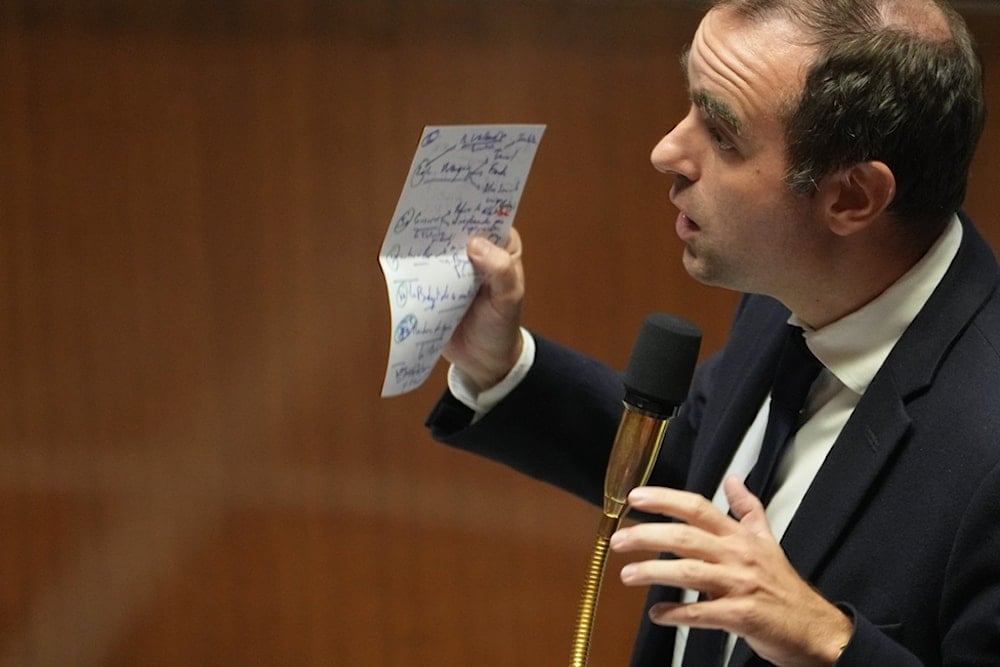Lecornu freezes Macron's pension reform in bid to avoid gov't collapse
In a bid to survive a no-confidence vote and ease public anger, France's Prime Minister Sébastien Lecornu has frozen Emmanuel Macron's contested pension reform.
-

French Prime Minister Sebastien Lecornu answers lawmakers after his policy speech at the National Assembly, Tuesday, Oct. 14, 2025, in Paris. (AP)
French Prime Minister Sébastien Lecornu has suspended President Emmanuel Macron's deeply unpopular 2023 pension reform until after the 2027 presidential election, a tactical move to avert a no-confidence vote and ease mounting political tension that has left the country's leadership hanging by a thread.
The announcement signals a rare retreat from the Élysée and underscores the fragile state of Macron's second term. His government has struggled to govern effectively since the 2024 snap elections produced a hung parliament, splintered between the left, the far right, and the centrist coalition.
Reform that shook France
The 2023 pension overhaul was among Macron's most contentious domestic policies. It raised the retirement age from 62 to 64, a change that sparked months of mass strikes, nationwide demonstrations, and accusations that the government was out of touch with working-class realities. Critics argued that the reform disproportionately hurt blue-collar workers, women, and those in physically demanding jobs, many of whom start working younger and have shorter life expectancies.
The law was forced through parliament without a vote using Article 49.3 of the French Constitution, allowing the executive to bypass opposition but at the cost of public trust. The move was widely condemned as undemocratic, with unions and protesters denouncing it as a "presidential coup".
Strategic pause
Faced with persistent public backlash and the threat of losing his parliamentary majority, Lecornu, who was reappointed as prime minister last week after briefly resigning, announced to lawmakers that the reform would be frozen. "I will propose to parliament, starting this autumn, that we suspend the 2023 pension reform until the presidential election," he said. "No increase in the retirement age will take place from now until January 2028."
He further pledged to abandon the use of Article 49.3, promising instead to put all major legislation to debate and vote in the National Assembly. "The government will make suggestions, we will debate, and you will vote," he said, earning applause from the Socialist benches.
Socialist lifeline
The suspension appears to have swayed the Socialist Party (PS), whose deputies hold the balance of power in the divided legislature. PS parliamentary leader Boris Vallaud hailed the move as a "victory" and said the party was "prepared to take a bet" on continued dialogue, suggesting it would not support any no-confidence votes this week.
Fellow Socialist Laurent Baumel confirmed that the party "will not vote in favour" of toppling the government or submit its own motion "for the time being." With backing from the center-right Les Républicains (LR), Lecornu may narrowly survive the test, though any shift in Socialist unity could still prove fatal.
Economic toll, political precedent
Lecornu acknowledged that suspending the reform will come with a fiscal price tag, €400 million in 2026 and €1.8 billion in 2027, benefiting roughly 3.5 million workers. "It will therefore have to be financially compensated, including through cost-saving measures," he said.
Finance Minister Roland Lescure warned last week that postponing the law would "cost billions" by 2027, complicating France's goal of reducing its budget deficit from 5.8% of GDP last year to below 5%. Lecornu's new austerity budget calls for an "exceptional contribution" from large corporations and the wealthiest households to offset the suspension's impact.
The political risk is considerable: pension reform has already claimed casualties in Macron's government. Two of Lecornu's predecessors, Michel Barnier and François Bayrou, were ousted after attempting to pass similar spending reforms through a hostile assembly. Lecornu now faces the same uphill battle to restore fiscal discipline without reigniting social unrest.
Divided France
The far-left France Unbowed (LFI) and far-right National Rally (RN) remain defiant. "We will not be participating in your salvation," declared LFI's Mathilde Panot, while RN leader Jordan Bardella accused mainstream parties of forming a "circle of Emmanuel Macron's saviours," united only by "fear of the ballot box and fear of the people."
Still, LR leader Laurent Wauquiez urged stability, saying his party "will not be among those who bring down prime ministers. France needs a minimum of stability."
For Lecornu, the suspension may buy time, but it does not end the crisis. The pension law remains deeply divisive, and France's streets could once again fill with protesters if the government revisits it after 2027.
Read more: 52% of French support right-wing coalition amid political crisis: Poll

 5 Min Read
5 Min Read








